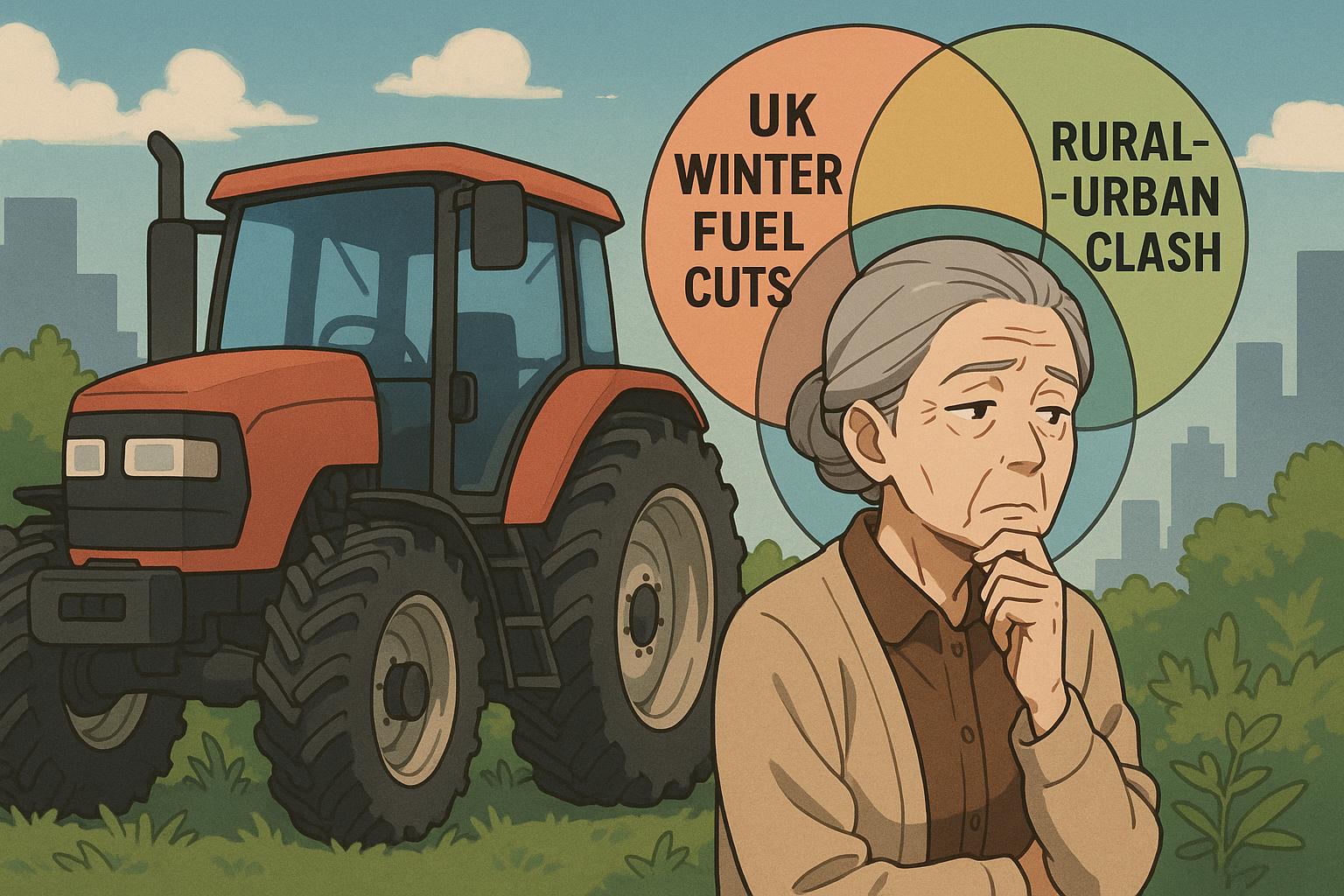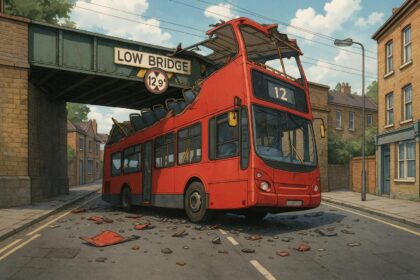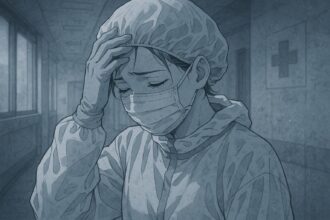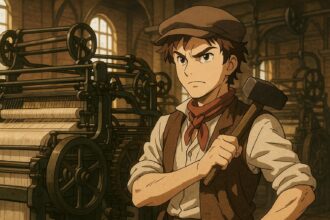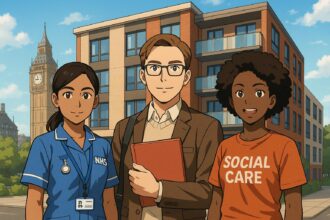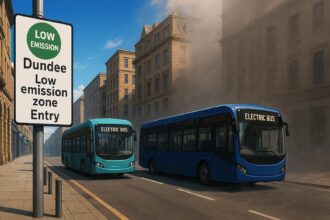Through clever and humorous Venn diagrams, Edith Pritchett captures the divisive Labour Party cut to winter fuel payments, juxtaposing it with unexpected rural encounters and urban wildlife surprises to reflect the complex interplay of politics, daily life, and environmental change.
Edith Pritchett’s latest cartoon encapsulates the complexities and peculiarities of current socio-political issues through engaging Venn diagrams, accentuating the humorous connections that can be drawn from seemingly disparate subjects. At the forefront of her illustrations is the UK Labour Party’s controversial decision to reverse winter fuel payments, a move that has divided public opinion and sparked significant discussion about fiscal policy and social welfare.
In her depiction, the shift is cleverly juxtaposed with an unexpected encounter involving a tractor, suggesting that just as rural and urban experiences occasionally collide in unexpected ways, so too do political decisions intersect with personal circumstances. The significance of the winter fuel payments—introduced in 1997 to aid the elderly with heating costs—cannot be understated. However, a recent announcement by Labour’s Chancellor, Rachel Reeves, reveals a substantial cutback, limiting eligibility to pensioners receiving pension credit. This shift reduces the number of beneficiaries from over 11 million to a mere 1.5 million, a move aimed at addressing a £22 billion fiscal deficit and potentially saving the government £1.5 billion annually.
Pritchett’s diagrams do not solely focus on austerity measures; they also explore the accidental benefits of urban spaces, with vacant lots becoming unintentional wildlife habitats. This observation resonates with broader environmental discussions about how urban development can sometimes provide sanctuary for nature, mimicking a “missed shaving patch” that unexpectedly supports wildlife. The contrast between human actions and ecological outcomes serves to highlight potential benefits amidst political transitions.
Moreover, the cartoon subtly references the arrival of new bird species in the UK, akin to finding dirty crockery left behind by a flatmate. This personal analogy not only evokes the chaos of communal living but also underscores the idea that as societal norms shift, so too do the markers of our environment. Such insights reflect the interconnectedness of ecological changes and societal transformations.
Through her sharp wit and perceptive commentary, Pritchett presents a unique narrative that examines how political decisions impact daily lives, often in unexpected ways. Her work not only entertains but also invites viewers to ponder the implications of policy changes on personal and communal levels. The dialogue surrounding the Labour Party’s cuts, alongside the environmental quirks of urban life, illustrates a world where politics and everyday experiences are inextricably linked.
Ultimately, Pritchett’s Venn diagrams serve as a mirror to our contemporary society, revealing how intertwined our policies are with the quirks and incidents of daily living, creating a tapestry of irony, humour, and reflection that is both thought-provoking and entertaining.
Reference Map:
- Paragraph 1 – [1], [2]
- Paragraph 2 – [1], [7]
- Paragraph 3 – [1], [2]
- Paragraph 4 – [1], [2]
- Paragraph 5 – [1], [2], [7]
Source: Noah Wire Services
- https://www.theguardian.com/lifeandstyle/picture/2025/jun/02/from-labour-on-winter-fuel-payments-to-a-tractor-encounter-edith-pritchetts-week-in-venn-diagrams-cartoon – Please view link – unable to able to access data
- https://www.theguardian.com/lifeandstyle/picture/2025/jun/02/from-labour-on-winter-fuel-payments-to-a-tractor-encounter-edith-pritchetts-week-in-venn-diagrams-cartoon – Edith Pritchett’s cartoon presents Venn diagrams illustrating: 1) Vacant urban lots becoming accidental wildlife refuges, akin to a missed shaving patch; 2) Labour’s reversal on winter fuel payments, compared to an awkward tractor encounter; 3) New bird species arriving in the UK, likened to unexpected dirty crockery in a flatmate’s room.
- https://www.theguardian.com/lifeandstyle/picture/2025/apr/28/from-water-pollution-to-stained-cushions-edith-pritchetts-week-in-venn-diagrams-cartoon – Edith Pritchett’s cartoon features Venn diagrams depicting: 1) Trump’s influence on Harvard, compared to the struggle of fitting a sheet; 2) Monitoring the alt-right, likened to bleaching a moustache; 3) England’s water pollution, akin to flipping a stained cushion to find another stain.
- https://www.theguardian.com/lifeandstyle/picture/2024/sep/02/edith-pritchett-week-in-venn-diagrams-cartoon – Edith Pritchett’s cartoon showcases Venn diagrams illustrating: 1) Trump’s impact on the Republican Party, compared to unintentional contamination; 2) Online disinformation, likened to a sprouting potato in a cupboard; 3) Oil spills, akin to a banana in a lunchbox polluting everything.
- https://www.theguardian.com/lifeandstyle/picture/2024/sep/16/edith-pritchett-week-in-venn-diagrams-cartoon – Edith Pritchett’s cartoon presents Venn diagrams depicting: 1) Politicians trying to stay on message, compared to navigating an automated phone menu; 2) AI shaping our world, likened to the uncertainty of using cloves in a recipe; 3) Kamala Harris’s role in Bidenomics, akin to distancing oneself from last week’s screen time report.
- https://www.theguardian.com/lifeandstyle/picture/2025/apr/07/from-polling-to-pasta-quantities-edith-pritchetts-week-in-venn-diagrams-cartoon – Edith Pritchett’s cartoon features Venn diagrams illustrating: 1) Trump’s contradictory statements, compared to children bouncing on a trampoline; 2) Polling, likened to miscalculating dried pasta quantities; 3) Badenoch’s forecast for the May local elections, akin to seeking a larger size in a changing room.
- https://www.theguardian.com/society/article/2024/sep/09/explainer-uk-labour-winter-fuel-payments-cut – The article explains the UK Labour Party’s decision to cut winter fuel payments, a benefit introduced in 1997 to assist older people with heating costs. The policy change, announced by Chancellor Rachel Reeves, limits payments to pensioners receiving pension credit, reducing recipients from over 11 million to about 1.5 million. The move aims to save approximately £1.5 billion annually and addresses a £22 billion fiscal deficit.


